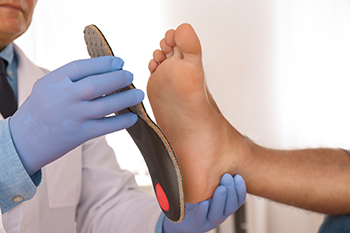
Custom Orthotics aren't just about comfort; they're your shield against injury and fatigue. By aligning your feet just right, they reduce strain on muscles and joints, ensuring you stay active longer without the usual wear and tear. Whether you're an athlete pushing limits or someone seeking day-to-day ease, Custom Orthotics offer the support you need. Don't let fatigue set the pace; with Custom Orthotics, you're always one step ahead. Call today for more information.

Offloading devices are used to reduce pressure on specific areas of the foot where ulcers have formed, helping to prevent further damage and support healing. Offloading devices typically shift body weight away from the wound, which decreases friction and mechanical stress. Total contact casts provide the highest level of pressure relief by fully immobilizing the foot and ankle, making them effective for deep or persistent ulcers. For patients needing more flexibility, removable cast walkers not only offer protection but also allow access for wound inspection. Custom orthotics and specialized shoes with cushioned soles are often used for less severe ulcers or during the later stages of healing. Offloading sandals and pneumatic boots may help with minor ulcers by offering light support and comfort for indoor use. Choosing the right device depends on the size and depth of the ulcer, the location on the foot, and the patient’s ability to move independently. If you have foot ulcers that require wound care, it is suggested that you schedule an appointment with a podiatrist to see if offloading devices may work for you.
Wound care is an important part in dealing with diabetes. If you have diabetes and a foot wound or would like more information about wound care for diabetics, consult with Joseph M. LaCava, DPM from Arkansas. Our doctor will assess your condition and provide you with quality foot and ankle treatment.
What Is Wound Care?
Wound care is the practice of taking proper care of a wound. This can range from the smallest to the largest of wounds. While everyone can benefit from proper wound care, it is much more important for diabetics. Diabetics often suffer from poor blood circulation which causes wounds to heal much slower than they would in a non-diabetic.
What Is the Importance of Wound Care?
While it may not seem apparent with small ulcers on the foot, for diabetics, any size ulcer can become infected. Diabetics often also suffer from neuropathy, or nerve loss. This means they might not even feel when they have an ulcer on their foot. If the wound becomes severely infected, amputation may be necessary. Therefore, it is of the upmost importance to properly care for any and all foot wounds.
How to Care for Wounds
The best way to care for foot wounds is to prevent them. For diabetics, this means daily inspections of the feet for any signs of abnormalities or ulcers. It is also recommended to see a podiatrist several times a year for a foot inspection. If you do have an ulcer, run the wound under water to clear dirt from the wound; then apply antibiotic ointment to the wound and cover with a bandage. Bandages should be changed daily and keeping pressure off the wound is smart. It is advised to see a podiatrist, who can keep an eye on it.
If you have any questions, please feel free to contact our office located in Hot Springs, AR . We offer the newest diagnostic and treatment technologies for all your foot care needs.

Orthotics play an important role in managing diabetic foot by providing support, pressure relief, and protection. Diabetes can lead to nerve damage and poor circulation, increasing the risk of foot ulcers and injuries. Orthotic devices help distribute weight evenly, reducing pressure points that may cause skin breakdown. Proper cushioning and arch support minimize friction and impact, preventing blisters and calluses. Additionally, custom orthotics can also help correct foot alignment, reducing strain on joints and improving mobility. By enhancing stability and comfort, orthotics allow individuals with diabetes to walk more safely and reduce the risk of complications. If you have diabetes, it is suggested that you are under the care of a podiatrist who can provide custom-made orthotics as part of your treatment.
If you are experiencing discomfort in your feet and would like to try custom orthotics, contact Joseph M. LaCava, DPM from Arkansas. Our doctor can provide the care you need to keep you pain-free and on your feet.
What Are Custom Orthotics?
Custom orthotics are inserts you can place into your shoes to help with a variety of foot problems such as flat feet or foot pain. Orthotics provide relief and comfort for minor foot and heel pain.
Over-the-Counter Inserts
Shoe inserts come in a wide variety and are used to treat foot pain, heel pain, and minor problems. For example, arch supports can be inserted into your shoes to help correct overarched or flat feet, while gel insoles are often used because they provide comfort and relief from foot and heel pain by alleviating pressure.
Prescription Orthotics
If over-the-counter inserts don’t work for you or if you have a more severe foot concern, it is possible to have your podiatrist prescribe custom orthotics. These high-quality, custom inserts are designed to treat problems such as abnormal motion, plantar fasciitis, and severe forms of heel pain. They can even be used to help patients suffering from diabetes by treating foot ulcers and painful calluses and are usually molded to your feet individually, which allows them to provide full support and comfort.
If you're experiencing minor to severe foot or heel pain, it’s recommended to speak with your podiatrist about the possibility of using custom orthotics or shoe inserts. A podiatrist can determine which type of custom orthotic or shoe insert is right for you and help you take the first steps toward being pain-free.
If you have any questions please contact our office located in Hot Springs, AR . We offer the newest diagnostic and treatment technologies for all your foot and ankle needs.

